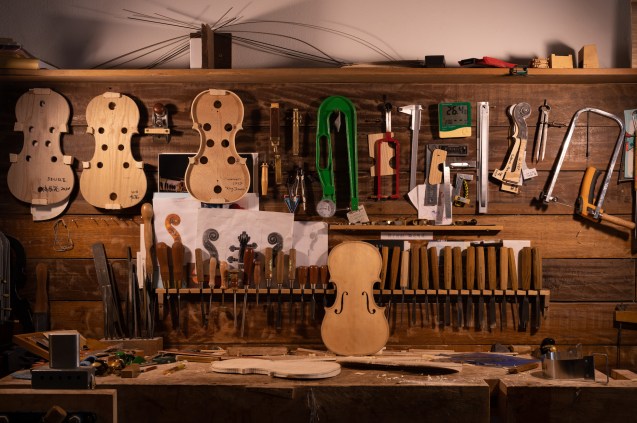
When Lydia Ho witnessed the construction of a musical instrument, she had a Leica M11 on hand. In September 2021, the photographer observed violin builder Tan Chin Seng at his workplace in Kuala Lumpur. Being a musician herself, she knew right away what was important: great dexterity. Ho skilfully took advantage of the subdued lighting in the atelier to capture her sensitive imagery. In our conversation, the artist philosophises about how much taking pictures reminds her of painting and other art forms, how she applies her idea of aesthetics, and why, from her understanding, playing an instrument is closely related to taking photographs.
How do you find your topics, especially this one about the violin maker Tan Chin Seng and his craftsmanship?
In my photographic exploration of craftsmen, I immerse myself in the intricate worlds they create. It all starts with thorough research, understanding the craft’s nuances, and appreciating the tools and techniques that shape their art. I focus my lens on the intimate details of the crafting process — the hands at work, the tools worn by dedication, and the transformation of raw materials into art. These images encapsulate the magic of creation, weaving a story that goes beyond skill, revealing the heart and soul of the artisan.
What is it that you want to capture?
In essence, my photography is a journey of discovery, capturing not just the physicality of the craft but the profound beauty, emotion, and humanity that craftsmen infuse into every creation. Through my lens, I aspire to evoke a deeper appreciation for the artisans whose hands and hearts breathe life into art.
Tell us something about the luthier and his work.
Tan Chin Seng, is a distinguished violin luthier based in Kuala Lumpur, Malaysia. He has earned international acclaim with awards from Italy, (International Violin Making Competition, organised by ANLAI, National Association of Artistic Italian Lutherie, Italy) a testament to the exceptional quality of his craft. Beyond the accolades, Tan’s commitment extends to nurturing the next generation. Generously sharing his skill and knowledge, he takes on apprentices, ensuring the art of violin making continues to flourish in the hands of passionate and skilled artisans.
Did you discover similarities between building a camera and a violin?
Both camera making and violin crafting demand precision, attention to detail, and a balance between form and function. Skilled artisans in both fields meticulously select materials, rely on hand-craftsmanship, blend tradition with innovation, and infuse artistic expression into their work. Whether creating a camera or a violin, the craftsmanship involved in both processes is a testament to human creativity and technical expertise, showcasing human creativity and technical mastery in distinct ways.
Do you play an instrument yourself? What parallels are there to using a camera?
Both disciplines require dedicated practice, an understanding of technical intricacies, and the development of muscle memory to achieve optimal results. Beyond the technical aspects, I appreciate that, as a pianist and vocalist, I find both music and photography to be powerful channels for artistic expression. The seamless integration of skill and artistry in these pursuits allows for the conveyance of emotions, storytelling, and the establishment of meaningful connections with the audience.
What would you like the viewers to draw from this project, what was your intention?
The project unfolds a captivating narrative centred on the extraordinary craftsmanship of the award-winning violin maker in Malaysia. In a country where violin making is not commonplace, this project seeks to illuminate the passion and determination embedded in this artisan’s journey. Through a series of beautiful and artistic images, the project aims to convey more than just the technical aspects; it strives to evoke a deep appreciation for the artisan’s love for the craft.
Something that would also apply to photography.
Every photograph tells a story of meticulous dedication, showcasing the precision and skill required to transform raw materials into a harmonious masterpiece. It’s a celebration of an art form that goes beyond the ordinary in a setting where such craftsmanship might be unexpected. Through this visual journey, the project endeavours to connect viewers with the rarity and beauty of this craft in the Malaysian context, offering a unique and compelling perspective on the intersection of passion, determination, and craftsmanship.
What are your future intentions or challenges?
In an age where arts and craftsmanship are being overlooked in favour of mass production and cost-cutting, I would like to continue to showcase and highlight the artistry of craftsmen in my future projects, contributing to the preservation of their skills and traditions. I am also passionate about supporting the women photographers’ community to foster more inclusivity and gender equality within the field. By working closely with and encouraging fellow women photographers, I aim to contribute to a more diverse and vibrant photographic community.
Born in Ipoh, Perak, a quaint tin mining town 200km away from Malaysia’s bustling capital city, Kuala Lumpur, Lydia Ho is formally trained in music education, but found joy in both exploring and expressing her vivid imagination. She started with drawing and sharing imaginative tales with schoolmates, which eventually garnered her recognition and awards at both the school and state levels. This eventually led her to the world of photography, as another outlet for her to express her creativity. Her talent has earned her recognition from esteemed institutions such as the Prix De La Photographie Paris (PX3), and the International Photography Award (IPA). Lydia’s images have been featured in various magazines and newspapers, such as Digital Camera Magazine, LFI magazine and Design Concept Magazine. Find out more about her photography on her website and Instagram channel.
Leica M
The Leica. Yesterday. Today. Tomorrow.










